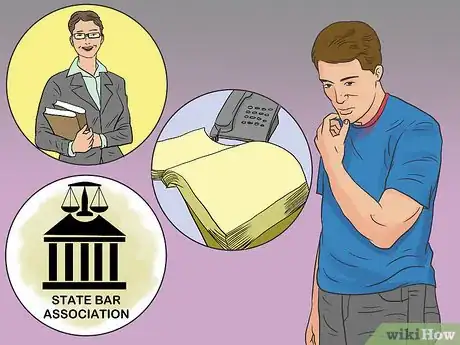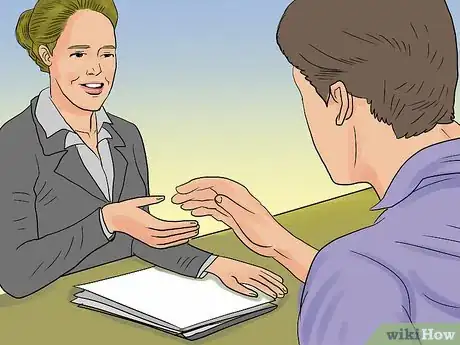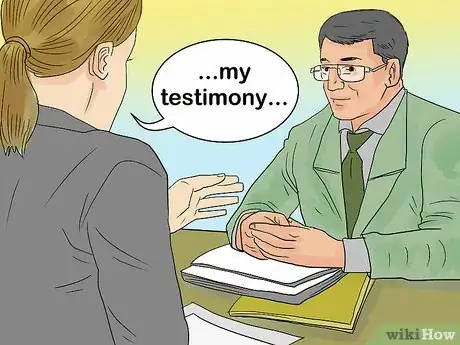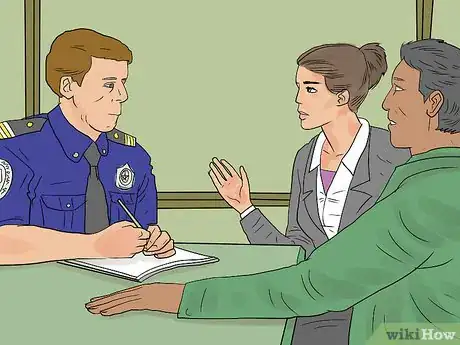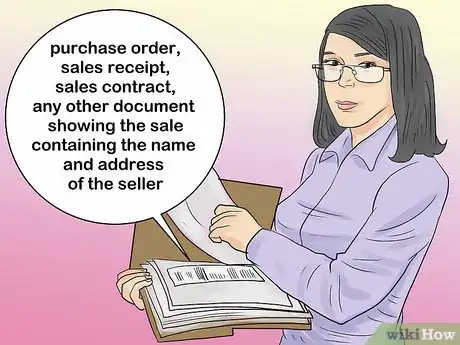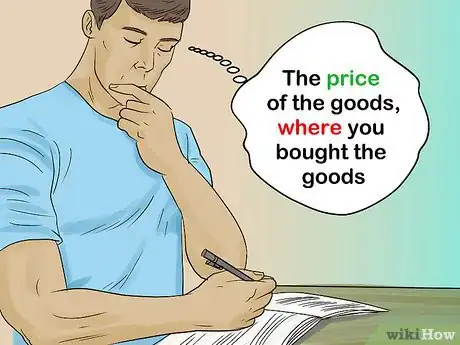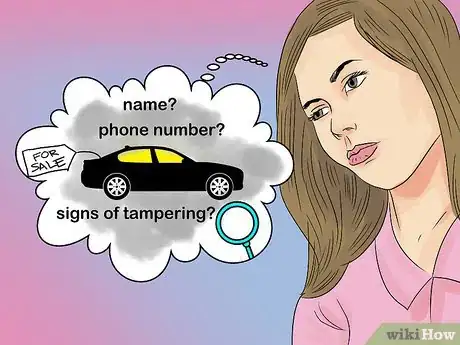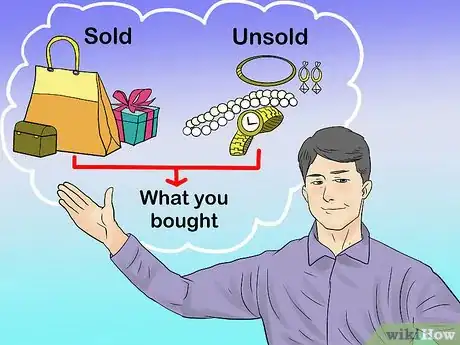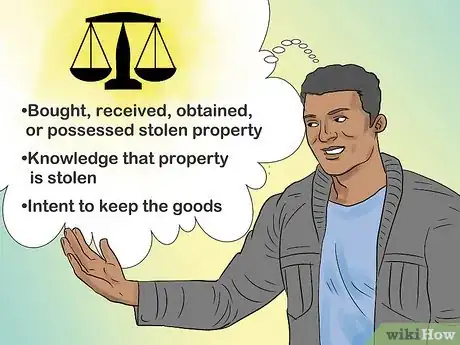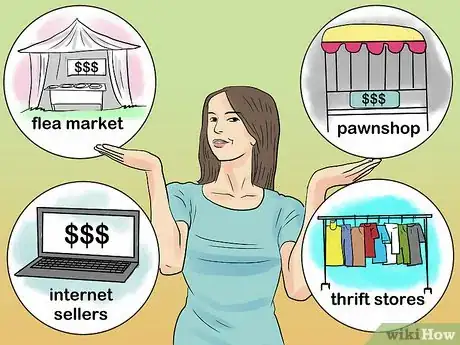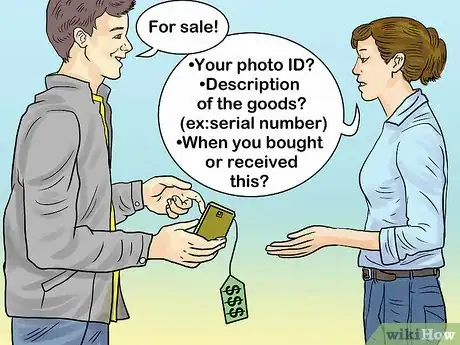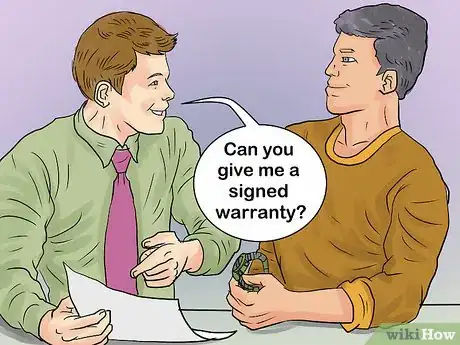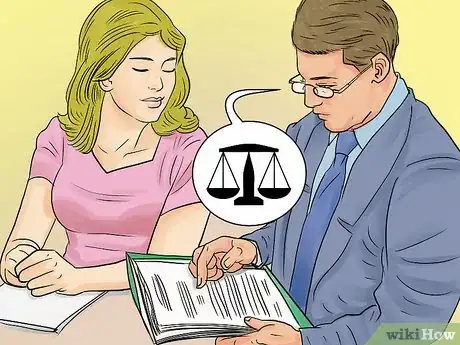This article was co-authored by Clinton M. Sandvick, JD, PhD. Clinton M. Sandvick worked as a civil litigator in California for over 7 years. He received his JD from the University of Wisconsin-Madison in 1998 and his PhD in American History from the University of Oregon in 2013.
There are 11 references cited in this article, which can be found at the bottom of the page.
This article has been viewed 18,527 times.
It is illegal to sell stolen property. However, you'll run afoul of the law by selling such property only if you do so "knowingly." If you sell property without knowing that it was previously stolen, you can protect yourself by hiring an attorney who will represent you. Your attorney will help prepare you for talking with the police and for explaining how you came into possession of the stolen goods in the first place.
Steps
Hiring an Attorney
-
1Get referrals. If you suspect that property you have sold was previously stolen, you should immediately contact an attorney. You will want an experienced criminal-defense attorney to help you. You can get referrals from the following sources:
- Other attorneys. You might have earlier used an attorney to draft a will or buy a house. You can contact him or her and ask for a referral to a criminal-defense attorney.
- Your phone book. Attorneys do advertise in the phone book. Look for one who identifies as a criminal-defense attorney.
- Your local or state bar association. These organizations are composed of attorneys. You can contact your nearest bar association and ask for a referral.
-
2Meet with an attorney. Once you have the name of someone, call the attorney and schedule a consultation. Ask how much he or she charges for the consultation. At your consultation, be sure to do the following:[1] [2]
- Ask the attorney how he or she would handle your case. For example, ask what evidence you need to avoid prosecution for selling stolen property.
- Find out how much the attorney charges to represent you. The attorney might charge hourly or by using a flat-fee arrangement.
- Ask the attorney to outline the strengths and weaknesses of your case. The attorney should explain what the prosecutor must show to convict you of selling stolen property in your state.
Advertisement -
3Discuss your testimony with your attorney. The worst thing you can do when the police contact you is to try to “talk your way out” of the charge. You might say something that incriminates you. The police will try to use your words against you later in court. Make sure to discuss with your attorney what you should tell the police.
- Your attorney will not help you lie. Accordingly, if you knew you were dealing in stolen property, let your lawyer know. Your strategy will be different. For example, you may be advised not to talk to the police at all.
-
4Meet with the police for questioning. The police might have contacted you about the stolen property. Alternately, you might want to contact the police and notify them that you think certain items you sold were stolen. You should stop by the police station along with your attorney.
Building Your Defense
-
1Document how you came to possess the property. You want proof that you legitimately took possession of the property. For example, you might have bought it from someone. You should look for any documents that show you thought you were buying the goods legitimately:
- A purchase order.
- A sales receipt.[3]
- A sales contract.
- Any other document showing the name and address of the seller.
-
2Write down your memories of the transaction. As soon as possible, you should write out what you remember of how you came into possession of the stolen goods. This information will prove critical to your defense. For example, write down the following:
- The price of the goods. If the price is significantly below the market price, you will need to explain why you weren’t suspicious that it was stolen. [4]
- Where you bought the goods. If you bought them in a legitimate store, then this helps show that you didn’t know they were stolen. However, when you buy things out of the back of a van (for example), a court might infer that you knew they were stolen.
-
3Look at the goods. Check to see if they look suspicious. If they do, you’ll have to explain why you didn’t suspect they were stolen. For example, look for the following: [5]
- Do the goods have someone’s name on them? Is this name the same as the seller’s? If not, you'll need to explain the disparity.
- Is there a phone number on the goods? Does the phone number belong to the seller? If not, be prepared to explain why this wasn’t a "red flag" for you.
- Had the goods been tampered with? For example, if you purchased a vehicle, was the ignition mechanism tampered with? Had the steering wheel mechanism been broken? If so, you'll need to explain why you didn't find this suspicious.
-
4Find proof that you didn’t sell all of the property. You might have purchased a bunch of goods and then subsequently sold only some of the items. This could be construed as proof that you didn’t know the items you bought were stolen. A court might assume that if you were dealing in stolen property, you would have resold all of the goods.
A court might assume that if you were dealing in stolen property you would have sold all of the goods.
Avoiding the Sale of Stolen Property
-
1Understand the law. Depending on your location, you could be charged with “dealing in stolen goods” if you knowingly sell stolen goods. However, some jurisdictions might charge you with theft or with receipt or possession of stolen goods (since you need to possess or receive them before selling them). These laws differ slightly from place to place. However, in order to convict you, a court would want to be satisfied of the following: [6]
- You bought, received, obtained, or possessed any property that was stolen.
- You performed those acts knowing the goods were stolen.
- You intended to keep the goods from the rightful owner.
-
2Determine whether you are a second-hand seller. Second-hand sellers get property from one party and sell it to another party. They are first buyers and then sellers. Some jurisdictions have laws that pertain to second-hand sellers. Second-hand sellers include:[7]
- flea markets
- pawn shops
- Internet sellers
- thrift stores
-
3Obtain important information from the seller. As a second-hand seller, you should always get information from whoever comes to your establishment to sell you goods. You want to be able to show the police that you made a good-faith effort to find out if the goods were legitimate or if they were stolen. You should get the following information: [8]
- The name of the seller. Ask for a photo ID, and check that it is valid. Write down the name of the seller and his or her address. You may also want to photocopy the ID.
- A description of the goods including serial numbers if available.
- When the seller bought or received the goods.
-
4Ask for a signed warranty if necessary. Your state might require that the seller attest that they are the owner of the merchandise. Texas, for example, has this requirement. [9] If your state has this requirement, then you should copy a blank form that you can use over and over. The seller will fill in their name and then sign the form.
- Your state might issue a contract that you can use. [10] You should check with the state department that licenses you to see if a form is available.
-
5Comply with all laws pertaining to second-hand sellers. Your state might have additional laws that you need to follow. Confer with your business attorney to make sure that you follow all of them.
- In Florida, for example, pawn shops must get a fingerprint of every seller they deal with. [11] They must also enter information into a statewide database.
References
- ↑ https://www.lawyers.com/legal-info/research/12-questions-to-ask-your-potential-lawyer.html
- ↑ http://www.ochba.org/page-18067
- ↑ https://vanillavideo.com/blog/2015/purchasing-goods-exercise-prudence-caution
- ↑ http://www.husseinandwebber.com/crimes/theft-fraud/dealing-in-stolen-property/
- ↑ http://www.husseinandwebber.com/crimes/theft-fraud/dealing-in-stolen-property/
- ↑ http://www.criminaldefenselawyer.com/crime-penalties/federal/Receipt-of-Stolen-Property.htm
- ↑ http://blogs.findlaw.com/blotter/2014/08/can-you-get-arrested-for-buying-stolen-goods.html
- ↑ http://codes.findlaw.com/tx/penal-code/penal-sect-31-03.html
- ↑ http://www.austintexas.gov/edims/document.cfm?id=174504
